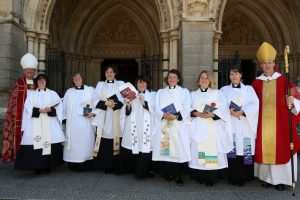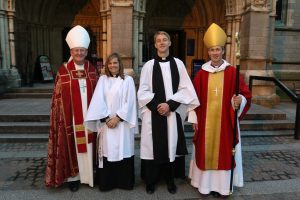New priests & deacons ordained


This weekend saw the Diocese of Truro welcome two new deacons and seven new priests at the annual Petertide Ordinations, which take place at Truro Cathedral.
The cathedral was full for the services which also saw the Rt Revd Tim Thornton, Bishop of Truro at his last ordinations in the diocese. Bishop Tim leaves to take up a post at Lambeth in the autumn.
On Friday evening, Bishop Tim along with the Rt Revd Chris Goldsmith, Bishop of St Germans and the Dean of Truro Cathedral The Very Revd Roger Bush led clergy in welcoming Revd Ian Gulland and Revd Rachel Monie as deacons. Ian will serve as Assistant Curate in St Austell while Rachel will be Assistant Curate in the benefice of Perranzabuloe and Crantock with Cubert; St Agnes and Mount Hawke with Mithian.
Then on Saturday, there was a family feel to the ordination for priests with Sue Norfolk, mother of Revd Kirsten Norfolk and churchwarden at St Petroc’s in Padstow, giving a reading. Revd Kirsten was ordained as priest later in the service and will continue to serve in Ludgvan, Marazion, St Hilary and Perranuthnoe.
Ordained alongside Kirsten was Revd Amanda Evans (South Carnmarth Deanery), Revd Arwen Folkes (St Just in Roseland and St Mawes), Revd Teresa Folland (Launceston), Revd Annabel King (Benefice of the Callington Cluster), Revd Nikki Thornhill (St Breoke & Egloshayle in Wadebridge and Revd Linda Whetter (Probus, Ladock, Grampound with Creed & St Erme).
Bishop Tim’s “Ordination Charge” included Ephesians, chapter 4, verses 1-16. The full ‘Ordination Charge’ can be seen below.
The services ended with congratulations from family, friends and colleagues.
Ordination Charge 2017 Ephesians chapter 4 verses 1 – 16
Your ordination today and tomorrow enables you to carry on responding as faithful disciples of Jesus Christ. It gives you permission to share your story and who you are with others so that they too may come to know something of the love of God in their lives. You, who know something of the grace of God, which you are well aware you do not deserve, but, you receive in overflowing buckets full can encourage and invite others to receive grace as well. Each of you is unique and therefore even more extraordinary to note that your presence as ordained people, as walking sacraments, makes a statement about unity. From that sense of being part of one body comes an awareness of your distinctive gifts and you are encouraged to consider how you will use them and distribute them. From that awareness also comes the reality that you flourish when you relate to others and work together for the equipping of the saints.
“But speaking the truth in love, we must grow up in every way into him who is the head, into Christ, from whom the whole body, joined and knit together by every ligament with which it is equipped, as each part is working properly, promotes the body’s growth in building itself up in love.” (v. 16)
What an extraordinary real vision that is for you who are to be ordained. You are public people given among other things, a role to speak out on behalf of the church, a role to witness to the love of God and a role to lead worship and administer the sacraments. In other words you are public people and as such it is your role to speak the truth in love, to grow up in every way into Christ. The image Paul goes on using in this verse is very gritty and real. The body in its parts, its ligaments and everything else knitted together.
How do you respond to such a verse? Often we respond by intellectualising or allegorising or contextualising. What about a physical and whole body response to a physical and whole body passage? You are being ordained the whole of you. This is real and it is important.
A key part of the genius of the Church of England is that we claim we are there for everyone. Now more than ever we need to make that claim effective. That means we need to be open to being used and mis-used by people for Christ’s sake. It means it is in the real encounters with people in the community that you will discover something of Christ. The church is in danger of hiding behind closed doors rather like the disciples pre – Pentecost. You, who are ordained, can take the risk of moving beyond those doors and allowing yourself to be in the way of people so that they can be encouraged and invited to join the way.
Through all of this, your ordination is a step on a pilgrimage on which you are now well and truly launched and the goal is maturity in Christ, “until we all of us come to the unity of the faith and of the knowledge of the Son of God, to maturity, to the measure of the full stature of Christ”. (v. 13).
Thank you for being willing to be open to God’s Spirit working in, and through, you. No doubt you will have spent time during your silent retreat talking to each other (what do you think I am stupid or something?!) and in that exchange I can imagine you will have noticed that there are enormous differences between you and enormous similarities. All of that reminds me to remind you that unity is a crucial imperative in the Bible. Not, please note, uniformity, never make the mistake of imagining that God wants us all to be the same. After all God has a sense of humour, he created us which proves he has a sense of humour, and, as creator, the sense of humour God has is by definition more extraordinary than everyone else’s. So God does not want uniformity and perhaps it is a sign of the sense of humour that God does want unity and expects us frail humans to deliver it.
It is also crucial to notice and do something about another paradox at the heart of what happens today and tomorrow. In one way this is personal (as someone once said). The focus of much of what is happening is on you, each one of you. We ordain you individually but we do so as deacons or priests in the church of God. This passage in Ephesians only makes sense if we accept that we all need each other and we are challenged by Paul to recognise our interdependence and our way to maturity is only through building up one another and working on what unity really means. I believe passionately that in your time in ordained ministry we will have to re-shape the way you minister and work. For far too long despite all the rhetoric the reality is we have fashioned sub heroic leaders. That is not what this passage says to me about the shape and nature of Christian ministry. How are you going to ensure that you do not get seduced by the often significant reality that if you want something done it is better and quicker to do it on your own? How are you going to avoid the temptation, which will be huge, to believe no one else understands how the church should really be shaped other than you? How are you going to make a priority of working with people rather than either working on your own at a distance from people or working against others? Please read this passage from Ephesians and recognise Paul is talking to more than one person and all he says, whilst there are implications for individuals cannot come to fruition by one person doing it on their own.
After tomorrow all of you will go your different ways. Of course, you will meet from time to time and, of course, you will change as you grow and move along your pilgrimage. I pray you will never lose sight of the imperative for unity which does not mean that we must all agree or we must all worship in the same way, heaven forbid. As I believe Paul is saying in this passage in Ephesians, unity is only possible if we understand who we are under God and how we relate to others and that involves a journey towards maturity which is nothing less than the measure of the full stature of Christ.
How will that imperative for unity show itself in your ministry? I am not thinking today of what part you will play in your local Churches Together group nor whether you will accept an invitation from a local Methodist church to preach. I am rather thinking about how you are going to try and build up the body of Christ in your churches where, as you know, sadly any unity can often be surface deep, and we seem to be able to fall out with each other over the most unusual of issues. As an ordained person and responding to the passage from Ephesians, I urge you to be a sign and symbol of unity in your ministry. “. . making every effort to maintain the unity of the Spirit in the bond of peace.” (v.3)
As you serve in your different contexts, I hope you can have in your minds, on a regular basis, what it means to be moving towards maturity in your situation. Of course, that means that you can and should also note, that you are not yet mature, and please don’t worry about mistakes that you will make, and encounters from which you will learn, even if that means, as it will, learning the hard way by getting things wrong and having to say sorry and start again on a number of occasions.
Being mature, or moving towards maturity, means precisely recognising you are not perfect and accepting that other people will from time to time have wrong and false expectations of you, especially in the role you now strive to inhabit. That does not mean that they are always right nor that you are always right. This passage from Ephesians reminds us that human encounters are messy and real and often leave loose ends that do not always get resolved. You are not called to be messiahs or scapegoats or to be those who are fall guys for others or to be those who always fix it for others. You are called to be those who know you are loved and you allow that daily to shape your lives.
How will you demonstrate a movement towards maturity in your ministry? I encourage you to consider what you are going to say and when you are going to keep silent. To take risks and to challenge others and to ensure you name what is often left unnamed in church circles. We have no time to ignore the playing of games or the tendency to ape every other social organisation in the locality and not to be a distinctive Christian community.
I also encourage, and indeed, urge you, to ensure you practice the disciplines of ordained life and ensure the habits become ingrained in you. The disciplines of regular prayer, yes, using the offices of the church so that you are united with others around the world and through history. The discipline of contemplation and time for your own prayer life to develop with the help from others that you know you need. The discipline of studying the Bible and ensuring you give priority daily to the word of God. The discipline of recognising the huge temptations to individualism in ordained ministry so you identify someone to be your as it were, supervisor, however that works for you.
The discipline of taking your humanity seriously so you cherish your relationships, you love yourself appropriately, you continue to develop a sense of humour and, an appropriate balance in all you do. Never take yourself too seriously and never take yourself not seriously enough and never underestimate what God is wanting to do in and through you.
“But each of us was given grace according to the measure of Christ’s gift.” (v.7) Each of us, every single one of us, is given grace. I want to stick with that thought for a few moments especially now as you are on the brink of ordination. You are all too quick to displace any sense that you are worthy of what is about to happen. You have been called and you are given grace according to the measure of Christ’s gift. Grace is the unmerited gift of God. Grace is a gift, a gift for you, yes, each one of you. Grace is a word we say far too easily and we don’t allow it to dwell within us or to receive it fully for us. We say, ‘grace, mercy and peace’ at the start of the Eucharist or, we share the grace at the end of an event and, if we are brave, we actually catch each other’s eyes. But do we accept that we are given grace according to the measure of Christ’s gift?
I know you are not worthy. I am not worthy but God does not want us to wallow in our unworthiness. God gives us grace. It is unmerited, it is a gift and our life long work is to receive it, and in receiving it, to allow it to shape us and make us children of God, those who are moving towards nothing less than maturity, to the full stature of Christ.
This passage from Ephesians has a dynamic in it, and a reality to it, which means it is ideal for you who are to be ordained. If you do not at this moment have energy and dynamism and a sense of the awesome reality of the gift that is given to you, then you should not be ordained.
Equally, I want to say to you today, please keep alive that dynamism and reality. Our churches should be attractive communities where real engagement and encounter takes place. Your work is to make sure the walls between church and world are so perilously thin that all sorts and manner of people can access God’s grace. Your work is to make sure the worshipping community is so full of love and reality. It is such a joyous place, that others will not be able to stop themselves coming to take a look and finding they stay and turn their lives to Christ. Your work is to move far away from the safety of church and ‘churchiness’ so that you discover God’s kingdom in the most surprising of places, and you can identify it and signpost others to see it as well. Your work, of course, will never end, and so you must not be exhausted, but rather strive to balance your life, so that, your humanity is never lost, and, you become a pious shadow or a powerful prima donna. Rather your work should constantly drive you back to consider how you can become the mature disciple God invites you to become.
Today and tomorrow the reality of what you are doing is clear. Even clearer is the reality of what God is doing in you. Praise God for what he has called you to be. May your awareness of the grace that has been given you continue to grow day by day. May you relish the gifts that God lavishes on you and be bold in using those gifts in the service of the gospel. May you work for unity which is nothing less than the unity of faith. May you take the essential subversive step of ensuring you do not fall into the individualistic traps that are set for you often by the institutional church itself but live your life only and always working with others.
Here, in this sacred space, today and tomorrow, the Holy Spirit is at work. Here, in this sacred space, in the public light of an act of worship, God will bless you. Here, in this sacred space, you are invited to take the next step on your pilgrimage. This is not the moment for triumphalism or fatalism, it is not even the moment for either optimism or pessimism. It is the moment for the reality that is there in that passage from Ephesians. For the whole body challenge that Paul gives and which contains so many clues for us if only we have ears to hear.
Ephesians chapter 4 verses 1 – 16





